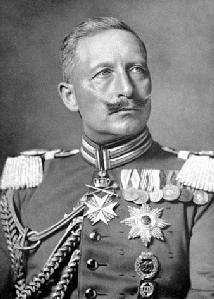Uncommon World War One Era Phrases
Here are some phrases that appear in the songs in this group and what they refer to.

'Kaiser Bill'
Emperor Wilhelm II of Germany.
The leader of the German side of World War One.
'Kaiser' is the German word for 'Emperor'.
While 'Wilhelm' is the German form of 'William',
'Bill' is not commonly used as a nickname for it.
'Fritz'
Slang for a German soldier. Fritz was a common German first name.
'The Hun'
Also slang for German soldiers.
The Huns were an ancient tribe of barbarians (i.e. Attila the Hun).
The Germans were cast as being directly
descended from them and equally barbaric.
'Over there'
Slang for France/Europe - where the war was,
as opposed to 'over here' in the United States.
'Over the foam'
Also slang for France/Europe - where the war was,
the 'foam' referred to the white cap waves of the ocean.
'[Those] who marched away'
Anyone who had enlisted in the army.
'[Doing your] bit'
Your share for the war effort. Whether enlisting in the army or buying a war bond.
'Repay our debt to France'
The American Revolution most likely would have failed
without military aid from our oldest ally France.
French guns, troops and ships tipped the balance especially at Yorktown.
When General Pershing, the head of the American army, arrived in France
he is quoted as saying "Lafayette, we are here"
referring to the French general who had worked so
intimately with George Washington.
'Kit'
We still use this word today in phrases like 'first aid kit' or 'repair kit'.
It simply means a group of items collected together for a particular use.
Each soldier had an 'army kit' which they carried
in their 'kit bag' (i.e. knapsack / backpack).
'Over the top'
Making an attack. One had to climb up out of their trench to move forward.
'No man's land'
The area between two opposing army's trenches which neither side controlled.
'Hello Central, give me [phone number]'
At the time of the First World War, direct dialing of telephones had not been invented.
Instead you would pick up your telephone receiver which would light an indicator light
at the telephone exchange and turn the crank ringing a bell there to request an operator.
The operator would ask you for the number you wanted and would ring them.
If that person was connected to a different exchange,
the operator would first have to call an operator
at that exchange to complete the connection.
Once the connection was set up the operator would ring you back
to tell you to begin your conversation.
When you finished you would hang up your receiver which would turn off the indicator light
and the operators would disconnect the lines.
If you have any questions, please e-mail me at
swezeyt@winternet.com.
Thank you for your interest in these recordings!

(c) 2007, Thomas F. Swezey. All rights reserved.
